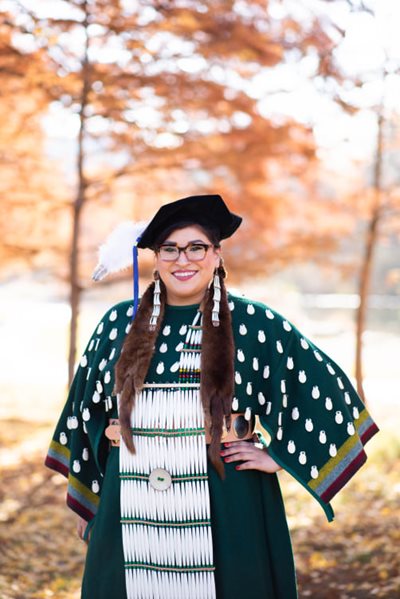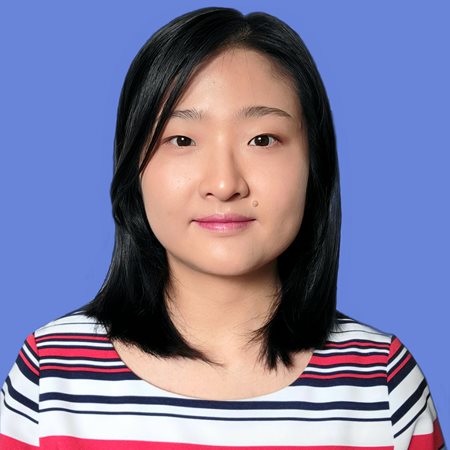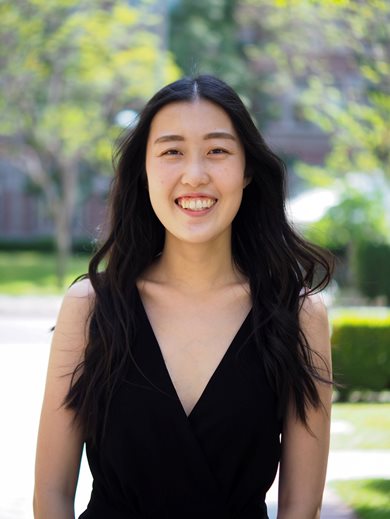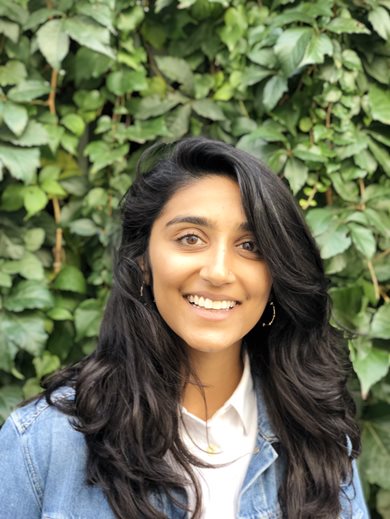May 2022
From the Director
Graduate Spotlight: Autumn Asher BlackDeer, PhD, MSW
Asian American and Native Hawaiian/Pacific Islander Heritage Month
AANHPI Resource Share
Join the Exclusive Online Community for MFP Fellows and Alumni
Master's Application Closing Soon
Update Your Contact Information
Resources
CSWE Diversity Center’s May Educator|Resource
Graduate Spotlight: Autumn Asher BlackDeer, PhD, MSW
Please join the MFP team in congratulating our soon-to-be alum, Dr. Autumn Asher BlackDeer, on her recent graduation. Keep reading to learn how she’ll continue making lasting impacts on individuals, groups, and communities through her postdoctoral work.
Autumn Asher BlackDeer, PhD, MSW
 Autumn Asher BlackDeer recently completed her PhD in social work with a focus on structural violence against American Indian and Alaska Native communities. Dr. BlackDeer is a queer decolonial scholar from the Southern Cheyenne Nation and serves as assistant professor in the Graduate School of Social Work at the University of Denver. BlackDeer centers Indigenous voices throughout her research by using quantitative approaches and big data as tools for responsible storytelling. BlackDeer is a racial equity scholar with an emphasis on Indigenous tribal sovereignty and is deeply committed to decolonizing the academy. During her time at Washington University in St. Louis, BlackDeer was a doctoral fellow for the CSWE’s Minority Fellowship Program, a Buder Fellow for the Buder Center for American Indian Studies, and a Chancellor’s Fellow for Washington University in St. Louis’s Chancellor’s Graduate Fellowship Program. She was the lead research assistant at the Center for Innovation in Child Maltreatment Policy, Research, and Training at the Brown School of Social Work, where she worked on the LEAD Predoctoral Summer Institute to recruit underrepresented minority child welfare professionals to return to the academy for their doctoral degrees and diversify the professoriate. BlackDeer also cofounded the BIPOC PhD Collective with Chancellor’s Fellow Maria Gandarilla Ocampo to hold a sacred space for fellow colleagues of color across social work doctoral institutions. She plans to continue this work throughout her career to decolonize the academy and help clear the path for future generations of scholars of color.
Autumn Asher BlackDeer recently completed her PhD in social work with a focus on structural violence against American Indian and Alaska Native communities. Dr. BlackDeer is a queer decolonial scholar from the Southern Cheyenne Nation and serves as assistant professor in the Graduate School of Social Work at the University of Denver. BlackDeer centers Indigenous voices throughout her research by using quantitative approaches and big data as tools for responsible storytelling. BlackDeer is a racial equity scholar with an emphasis on Indigenous tribal sovereignty and is deeply committed to decolonizing the academy. During her time at Washington University in St. Louis, BlackDeer was a doctoral fellow for the CSWE’s Minority Fellowship Program, a Buder Fellow for the Buder Center for American Indian Studies, and a Chancellor’s Fellow for Washington University in St. Louis’s Chancellor’s Graduate Fellowship Program. She was the lead research assistant at the Center for Innovation in Child Maltreatment Policy, Research, and Training at the Brown School of Social Work, where she worked on the LEAD Predoctoral Summer Institute to recruit underrepresented minority child welfare professionals to return to the academy for their doctoral degrees and diversify the professoriate. BlackDeer also cofounded the BIPOC PhD Collective with Chancellor’s Fellow Maria Gandarilla Ocampo to hold a sacred space for fellow colleagues of color across social work doctoral institutions. She plans to continue this work throughout her career to decolonize the academy and help clear the path for future generations of scholars of color.
Asian American and Native Hawaiian/Pacific Islander Heritage Month
May is Asian American and Native Hawaiian/Pacific Islander (AANHPI) month. The MFP joins in celebrating the generations of Asian American and Pacific Islanders (AAPI) who have enriched social work education and are instrumental in promoting overall well-being in individuals, groups, and communities. This month we’re featuring fellows whose current work and participation with MFP contribute to this year’s AAPI month theme of “Advancing Leaders Through Collaboration.”
Cho Rong Claudia Won, LMSW, PhD Candidate
 Using the community-based participatory research approach, my current work focuses on the lived experiences of microaggression and its impact on mental health among Korean immigrants in ethnic resource-short areas. Since the beginning of my PhD years, I have been part of a research team focused on assessing the needs of Korean immigrants in Alabama where ethnic resources (e.g., health care, banking service) are limited. Preliminary findings revealed that needs for resources in these areas and the presence of Asian hate experiences were prevalent even before the COVID-19 pandemic. Hence, I aim to provide a comprehensive understanding of the microaggression experienced by this population using mixed-methods research. Since previous studies on microaggression among minorities show that socio-ecological levels play a factor in people’s experiences, my work will provide implications for collaboration with leaders from diverse fields (e.g., employers, host community, ethnic community, mental health providers, social workers, politicians).
Using the community-based participatory research approach, my current work focuses on the lived experiences of microaggression and its impact on mental health among Korean immigrants in ethnic resource-short areas. Since the beginning of my PhD years, I have been part of a research team focused on assessing the needs of Korean immigrants in Alabama where ethnic resources (e.g., health care, banking service) are limited. Preliminary findings revealed that needs for resources in these areas and the presence of Asian hate experiences were prevalent even before the COVID-19 pandemic. Hence, I aim to provide a comprehensive understanding of the microaggression experienced by this population using mixed-methods research. Since previous studies on microaggression among minorities show that socio-ecological levels play a factor in people’s experiences, my work will provide implications for collaboration with leaders from diverse fields (e.g., employers, host community, ethnic community, mental health providers, social workers, politicians).
Participation in the MFP supports my past, present, and future endeavors in the following ways: (1) networking opportunities with scholars from diverse backgrounds and (2) the provision of educational opportunities, including research skill training and specific topic training (e.g., mental health, microaggression). These opportunities have opened and will continue to open my eyes to varying perspectives and will support provision of culturally sensitive services that aim to empower the Korean immigrants and other ethnic minorities without hindering their desired way of life yet supporting healthy living and increasing protective factors as a minority community in the United States.
Gloria Chan, MSW Candidate
 It has been a privilege to pursue higher education in mental health and to have opportunities to learn at various community agencies in the past few years. As an Asian American, I have found power in honoring both my Asian and my American identities to find connection and develop collaborations across backgrounds and contexts. I believe we can accomplish so much more collectively than individually when we utilize the strengths found in our differences and choose to amplify each other, especially in the face of adversity. I see that the experiences and skills I’ve gathered thus far are the fruit of not my hard work alone but the investment by, collaboration with, and support from all those around me. I am humbled in my clinical work with Asian and Asian American folks who choose to seek support despite overwhelming barriers and disparities. I am inspired by my colleagues at MFP and my fellow board members at the University of Southern California Asian Pacific Islander Social Work Caucus who choose to dismantle oppressive systems at every level of society. I commend CSWE for choosing to uplift folks who have been historically minimized and excluded from dominant discourse. As I continue to grow as a clinician, as a social worker, and as a human, I will joyfully and intentionally invest in, collaborate with, and support all current and future clients, colleagues, and communities whom I have the honor of partnering with, just as others have done for me.
It has been a privilege to pursue higher education in mental health and to have opportunities to learn at various community agencies in the past few years. As an Asian American, I have found power in honoring both my Asian and my American identities to find connection and develop collaborations across backgrounds and contexts. I believe we can accomplish so much more collectively than individually when we utilize the strengths found in our differences and choose to amplify each other, especially in the face of adversity. I see that the experiences and skills I’ve gathered thus far are the fruit of not my hard work alone but the investment by, collaboration with, and support from all those around me. I am humbled in my clinical work with Asian and Asian American folks who choose to seek support despite overwhelming barriers and disparities. I am inspired by my colleagues at MFP and my fellow board members at the University of Southern California Asian Pacific Islander Social Work Caucus who choose to dismantle oppressive systems at every level of society. I commend CSWE for choosing to uplift folks who have been historically minimized and excluded from dominant discourse. As I continue to grow as a clinician, as a social worker, and as a human, I will joyfully and intentionally invest in, collaborate with, and support all current and future clients, colleagues, and communities whom I have the honor of partnering with, just as others have done for me.
Priya Bhanderi, MSW Candidate
 For true collaboration to flourish, we must meet each other with open ears, open hearts, and open minds. This type of engagement takes time, space, and mutual respect—all of which I was fortunate to have in my final field placement and in my relationship with my MFP mentor. The primary goal of my placement in the Social Work and Diversity (SWD) Program at the Ackerman Institute for the Family was to train students of color in the delivery of family therapy services to diverse communities and to develop leaders who can bring a family systems perspective to social service agencies and institutions. I met with five teammates and two supervisors for 15 hours a week to prepare and debrief every client session, work with couples and families in co-therapy teams, and draw insights from each other’s lived experiences and histories. Throughout our year together, we developed deep intimacy and respect for each other, the ability to explore and appreciate differences in relationships, and a shared goal for everyone to succeed and grow. Equipped with my supportive SWD community, tangible skills for collaboration, and a generous and thoughtful MFP mentor, Aminda Heckman, I have faith in my ability to learn, lead, and uplift others as I work alongside clinicians and clients after graduation.
For true collaboration to flourish, we must meet each other with open ears, open hearts, and open minds. This type of engagement takes time, space, and mutual respect—all of which I was fortunate to have in my final field placement and in my relationship with my MFP mentor. The primary goal of my placement in the Social Work and Diversity (SWD) Program at the Ackerman Institute for the Family was to train students of color in the delivery of family therapy services to diverse communities and to develop leaders who can bring a family systems perspective to social service agencies and institutions. I met with five teammates and two supervisors for 15 hours a week to prepare and debrief every client session, work with couples and families in co-therapy teams, and draw insights from each other’s lived experiences and histories. Throughout our year together, we developed deep intimacy and respect for each other, the ability to explore and appreciate differences in relationships, and a shared goal for everyone to succeed and grow. Equipped with my supportive SWD community, tangible skills for collaboration, and a generous and thoughtful MFP mentor, Aminda Heckman, I have faith in my ability to learn, lead, and uplift others as I work alongside clinicians and clients after graduation.
AANHPI Resource Share
To further commemorate AANHPI Heritage Month, CSWE is spotlighting educational resources concerning AANHPI issues or written by AANHPI authors.
You are invited to share any AANHPI-related clinical or curricular resources, journal articles, research, culturally relevant assessment tools, workbooks, or other scholarly work through CSWE’s Spark. Check out resources shared by fellows featured above!
Gloria Chan, MSW Candidate
- Asian Mental Health Collective works to destigmatize mental health and increase access to quality mental health services in Asian communities, as well as collaborate with Asian mental health professionals and celebrate Asian stories. There are a myriad of events, resources, and stories available on their website as well as a directory of Asian mental health professionals in Canada and the United States.
- Asian Americans Advancing Justice is a national affiliate of five civil rights nonprofit organizations. They work toward empowering AAPI and other underserved communities and advocate for civil and human rights. Collectively, they work on policy advocacy, provide legal services and advocacy, and create training opportunities and resources to invite community members to participate in building a more equitable society.
Priya Bhanderi, MSW Candidate
- Co-Constructing Cooperation With Mandated Clients by Peter De Jong and Insoo Kim Berg offers a strengths-based, solution-focused approach to engaging with involuntary clients.
- Bridges is a stigma-free hub for Asians, Pacific Islanders, South Asian Americans (APISA) living in the greater New York City area; it features a directory of APISA mental health clinicians, as well as relevant resources, blogs, and podcasts on specific issues facing the community for both community members and the therapists who serve it.
Join the Exclusive Online Community for MFP Fellows and Alumni
CSWE is glad to upgrade your listserv experience with an exclusive CSWE Spark community dedicated to any and all conversations on social work research, education, and practice. Please join today!
Spark is CSWE’s online community for educators and social workers. This intuitive platform is designed to inspire conversation and collaboration among social workers, faculty members and administrators, students, interprofessional care providers, and other professionals around the world.
Your community can be used to:
- have real time conversations with daily or weekly notices of new posts;
- upload documents and materials;
- keep track of meeting minutes;
- share ideas or generate collaboration among members; and
- organize notes and discussion points.
If you haven’t yet created a Spark account, watch this brief tutorial on how to create an account and post content. Written instructions are also available.
Once you have created an account, please search for "Minority Fellowship Program (MFP)" in the search bar and request to join the community. When requesting to join, please provide a short message as to why you would like to join the community. Once we receive your request, we will grant you full access to the MFP Community.
Master's Application Closing Soon
The application cycle for CSWE’s 2022–2023 Minority Fellowship Program (MFP) for master’s students is open now through Wednesday, May 25!
The 1-year MFP master’s fellowship enhances the training of full-time, direct-practice focused, social work master’s students in the final year of study by providing specialized training on mental health and substance use disorder issues, a monetary stipend, and access to mentoring and professional development support.
The MFP team will be available to answer questions regarding the fellowship program, eligibility requirements, and the application process during the final Zoom Q&A session, scheduled for May 18 at 3:00 p.m. (ET). Given the session’s proximity to the application deadline, the space is being made exclusively available to people who have applications in progress. .
The application deadline is Wednesday, May 25, 2022, at 5:00 PM (ET). Learn more and apply here.
Please direct questions about application requirements to [email protected].
Update Your Contact Information
Have you changed jobs in the last few years? Changed your primary email address? The MFP relies on current contact information for our internal database, which we use to contact alumni and help us prepare our reports for the Substance Abuse and Mental Health Services Administration. Please use this link to share your updated contact information. Additionally, you are encouraged to reach out to MFP alumni you are connected with and request that they share their updated information too. Thank you in advance for supporting MFP staff efforts to enhance connectedness in the MFP community.
Resources
Professional Development Opportunities
Registration is now open for the 2022 National Association of Social Workers’ National Conference. Attend in person or virtually June 22–25, 2022, for “unparalleled opportunities in professional development, continuing education, and networking.” Find more information on the program schedule, speakers, hotel and travel, and exhibitors here and register today.
The Food First Fellows Program is a research, advocacy, and leadership fellowship for early career researchers, academics, and grassroots organization advocates. Its purpose is to nurture and grow the next generation of influential thought leaders capable of creating and implementing strategies in the food justice/food sovereignty space. This fellowship is part of the Institute for Food and Development Policy’s (better known as Food First) transition toward a BIPOC-led and BIPOC-focused organization. The inaugural cohort of up to three (3) fellows will serve a 1-year fellowship with a possible additional year extension. Learn more and apply by June 30, 2022.
NORC at the University of Chicago is pleased to invite advanced doctoral students, postdocs, and early career scholars to submit applications for NORC’s 2022 Diversity, Racial Equity, and Inclusion (DREI) Scholars Program. The 2022 DREI Scholars Program will prioritize applications focused on how race/ethnicity affects outcomes and processes or topics that reflect the intersectionality between race/ethnicity and other minoritized identities (e.g., race/ethnicity and disabilities, race/ethnicity and gender bias). Find the full call for applications here.
CSWE Diversity Center’s May Educator|Resource
Visit CSWE’s Center for Diversity and Social & Economic Justice to view the May Educator|Resource.
